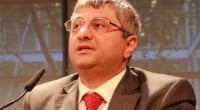Turkey: Inspiring or insidious

Date posted: May 2, 2011
Delphine Strauss, April 28 2011. Financial Times
In one corner of the courtyard, green-painted railings enclose the tomb of a saint. In another, a pair of 12-year-old boys in spotless white shirts and neatly pressed trousers politely answer visitors’ questions. In Diyarbakir, a city in Turkey’s Kurdish south-east where many children work on the streets or land in jail for throwing stones at security forces, these two have come to prepare for high school entrance exams. Asked what they want to do later, one says “doctor” and the other, grinning, declares “police”.
They are attending a study house run by supporters of Fethullah Gulen – a preacher who has inspired the creation of a vast network of schools and student dormitories that blend academic rigour, especially in the sciences, with a moral education based on Islamic principles.
“It’s not just explaining English or maths – it’s explaining what it means to be a good or bad person,” says the director of Diyarbakir’s 20 study houses. “In this system teachers come to school earlier, become friends with students and care about the relationship….In none of our schools do we teach religion. We tell them what’s right and wrong. We show them good and bad practice, and they decide.”
But in Turkey, opinion is sharply divided between those who see Mr Gulen as a force for social mobility and tolerance, and those who suspect he is insidiously undermining the country’s secular foundations. His followers have been described as “Islamic Jesuits” – and as Turkey’s equivalent of Opus Dei. Yet there is little doubt that the movement he inspires is now an important force shaping Turkish society, part of a broader evolution in which leaders emerging from a religious, business-minded middle class are gradually eclipsing older, fiercely secular, elites.
Mr Gulen – known to his admirers as hocaefendi, or respected teacher – now lives in leafy seclusion in Saylorsburg, Pennsylvania, nursing ill health and communicating largely though his published writings and speeches. Yet he has a following of millions, easily the most influential of Turkey’s religious communities. This Hizmet (“service”), as its friends call it, has a global reach: businessmen sympathetic to the cause have established schools – from Kazakhstan to Cambodia, the US to Iraq – and are rapidly opening them across Africa.
The professed aim of the schools is to create a “golden generation”, a new elite equipped to succeed in the global economy, while exemplifying faith, virtue and an ethos of serving others. When students graduate, many remain committed to the movement as they take up positions in teaching, business, media and public life.
This commitment and absorption in the life of the community is typical. Almost all supporters also make financial donations – 20 per cent of income is not unusual.
To outsiders, such zeal can inspire both admiration and unease. Secularists worry that Gulen missionaries, once persecuted by the state but now working freely under the rule of the mildly Islamist AK party, will transform Turkish society, increasing pressure to conform to conservative values. But the bigger fear , beyond ideology, is that Gulen followers may be infiltrating state institutions, using their influence to undeclared ends.
With his mild, contemplative expression and neat white moustache, Mr Gulen is not an obvious figure to inspire fear. Born in 1941 in the eastern province of Erzurum, he was largely self-taught after primary school but read voraciously – drawing inspiration from Said Nursi, a thinker who advocated reason, tolerance and distance from politics.
Mr Gulen began his career as an imam in Turkey’s state service, at a time when there appeared to be little choice between extreme conservatism and an extreme secularism that rejected Turkey’s history and religious traditions. Instead, he advanced an interpretation of Islam that stresses tolerance, condemns violence and embraces modernity. He has advocated action to alleviate poverty, promote education and advance dialogue between different religions.
Bill Park at King’s College, London, has described it as a “heady and promising combination of faith, identity, material progress, democratisation and dialogue”.
These messages make Mr Gulen a welcome antidote in the west to more radical ideologues. He has lived in the US since 1999, when he left Turkey under threat of prosecution during a clampdown on Islamists. In contrast to Turkey’s Islamist Milli Gorus movement, whose parties contest elections, Mr Gulen insists he has no political ambitions and preaches respect for authority – advising supporters to waive obligations, such as wearing the Islamic headscarf, if necessary to gain an education in the secular system. When sympathisers enter politics they are told to cut ties, says Mr Balci, the pro-Gulen columnist.
“The Nursi-Gulen tradition doesn’t envision an ‘Islamic state’. It rather seeks a liberal-democratic state that will be tolerant to its missionary work,” Mustafa Akyol, a commentator on religious affairs, wrote last year.
Read the full article at FT.COM as we are not able to publish all of it because of its copyright request.
Tags: Fethullah Gulen | Hizmet (Gulen) movement |
























